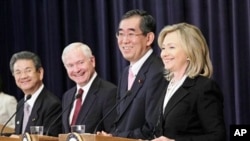"For more than 50 years, the alliance between Japan and the United States has been the cornerstone of security in the Asia Pacific region," said U.S. Secretary of State Hillary Rodham Clinton as she and the Secretary of Defense Robert Gates welcomed the foreign minister and the defense minister of Japan to Washington recently for the Security Consultative Committee meeting. "As the U.S.-Japan alliance enters its second half century, it remains indispensible to the peace, security, and economic dynamism of the Asia-Pacific Region."
In a Joint Statement issued under the title "Toward a Deeper and Broader U.S.-Japan Alliance," the members of the Security Consultative Committee revalidated and updated the Alliance’s Common Strategic Objectives, which included ensuring the security of Japan; strengthening trilateral security and defense cooperation with Australia and the Republic of Korea; deterring provocations, supporting a North-South dialogue and denuclearization of North Korea; encouraging China’s responsible role in regional stability and prosperity, as well as its cooperation on global issues, and adherence to international norms of behavior; strengthening security cooperation among the United States, Japan, and ASEAN, and supporting ASEAN’s efforts to promote democratic values and a unified market economy.
On a broader scope, the Joint Statement made clear that the U.S.-Japan Alliance seeks the peace and security of a world without nuclear weapons, while maintaining necessary deterrence; encourages Russia’s constructive engagement in the Asia-Pacific region; promotes stability and prosperity in the Middle East and North Africa by pursuing opportunities to support and encourage democratic reforms; ensures Iran’s full compliance with its international obligations under the Nuclear nonproliferation Treaty and return to serious negotiations regarding its nuclear program; ensures sustained progress in Afghanistan through continued support for the Afghan National Security Forces, and strengthens civilian efforts to promote effective governance and development.
The Joint Statement also underscored the U.S.-Japan Alliance's support for Pakistan’s efforts to strengthen civilian governance and to implement economic reforms; it welcomed India as an enduring Asia-Pacific partner, and promoted trilateral dialogue among the United States, Japan, and India.
Finally, the Joint Statement reaffirmed that "shared values, democratic ideals, common interests, and respect for human rights and the rule of law remain the foundation of the [U.S.-Japan] Alliance."
U.S. - Japan Alliance

"For more than 50 years, the alliance between Japan and the United States has been the cornerstone of security in the Asia Pacific region."



